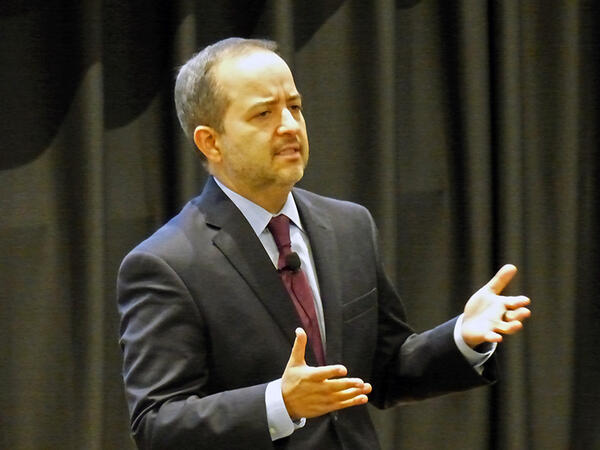From Reform to Regression: Yale Lecture Explores Mexico’s Democratic Backsliding

To Alejandro Poiré, democracy does not simply need defending. Instead, he said we must “reinvent and reconstruct the very concept of democracy.”
“I think the way in which we think about democracy contemporarily is simply insufficient,” Poiré said. “It’s not going to be the type of concept or blueprint that is actually going to solve the dilemma that democracies worldwide — and in particular those experiencing backsliding — are facing right now.”
In his lecture at Yale earlier this month, Poiré, a distinguished university professor on government and public transformation at Tecnológico de Monterrey in Mexico, highlighted the most recent report from the Varieties of Democracy (V-Dem) Research Project, finding 19 countries currently democratizing compared to 26 countries 20 years ago and 44 countries in which freedom of expression is deteriorating, compared with seven countries 20 years ago.
Poiré, whose service in the Mexican government included a stint as the secretary of the interior among many other roles, spoke about democratic backsliding through a Mexican lens.
“Not just because Mexico is interesting, which it is,” he said. “But because I think what has happened in my country in the previous decades is a very good cautionary tale for people who are concerned with self-government and the rule of law.”
Poiré spoke as part of the Program on Ethics, Politics, and Economics’ (EP&E) Robert H. Litowitz Lecture Series. The series was established to honor a scholar who died while attending Yale Divinity School, continuing to explore his interests in public ethics and policy that cross disciplines and bridge diverse religious traditions and cultures.
“It is a tremendous privilege to host this series, and we greatly appreciate the time and effort Alejandro Poiré took to speak with us,” said Ana De La O, EP&E director and ISPS faculty fellow. “There is much we can learn about the fragility — and hopefully the resilience — of democracy from our closest neighbor to the south.”
Poiré traced Mexico’s democratic evolution from the 1990s, highlighting institutional reforms and pluralism. He emphasized that while Mexico built strong electoral institutions and horizontal accountability mechanisms, it failed to develop a responsive and inclusive party system.
“We came up with this idea of political parties as entities of public interest,” he said. “But in a sense, what we turned them into were institutions that are highly insulated from the citizens — and highly insulated from social demands.”
Poiré detailed how campaign finance in Mexico is plagued by illicit funding and black-market media influence. He cited research showing that for every peso declared during an election campaign, 25 pesos are actually spent — often off the books and 10 times greater than the spending limit.
“Campaign finance ultimately is systematically corrupt,” he said.
Poiré explained how such a system creates a situation in which anyone running for elective office must deal with people asking for illicit money on their behalf, discouraging honest participation.
“And that’s the adverse selection problem,” he said. “We’re not choosing the best. And then the moral hazard problem is that the people who are actually going to do the best in terms of winning elections are the ones that are the best at getting illicit cash and using illicit cash and putting it to work. That’s bad. That’s really bad.”
Poiré argued that populist leaders exploit distrust of elites and offer symbolic inclusion, even as they dismantle democratic institutions.
“And my argument is that it takes two to tango,” he said. “People actually look at the world, and they say, ‘Yeah, maybe they’re right.’ And yes, I don’t think that I am thrilled to support this populism, but I certainly can identify with what they are saying and what they are denouncing.”
In addition, Poiré warned of constitutional reforms that expand military power and undermine judicial independence.
Former Mexican president Ernesto Zedillo attended the lecture and delivered a forceful critique of the current Mexican government, asserting that democracy has been constitutionally dismantled. At Yale, Zedillo is the Frederick Iseman ’74 Director of the Program for the Study of Globalization at the Yale Jackson School of Global Affairs and a professor in the field of international economics and politics; professor of international and area studies; and professor adjunct at the Yale School of the Environment.
Zedillo accused the government and its party of manufacturing supermajorities illegally; eliminating the independent and professional judiciary; eliminating other autonomous institutions created to prevent abuse of executive power; depriving the Supreme Court of the duty to review constitutional changes passed by Congress, undermining human rights protections; transferring the national police to the army and giving it the legal capacity to investigate alleged crimes; and enhancing the justifications for preventive detention without due process — to silence dissent.
In addition, he accused the government of using fiscal resources without transparency and accountability to establish the machinery of clientelism, the practice of selling goods and services for political support.
“Structurally, Mexico is no longer a democracy,” Zedillo said of what he considered only a partial list of actions intended to eliminate the basis of the young Mexican democracy. “We have a system where one party will be able to stay in power forever.”
Poiré largely agreed with Zedillo’s assessment, though he cautioned against cultivating excessive despair and called for mixing a fair assessment of missteps with a commitment to positive progress.
“I really think what I am trying to do in this first step is to say: Look, yes, a number of things that we did were wrong,” he said. “It doesn’t mean that people who are actually the ones engaged in the backsliding are not responsible for it. I’m not saying that. But I’m also trying to think that, OK, how do we rebuild the dream?”